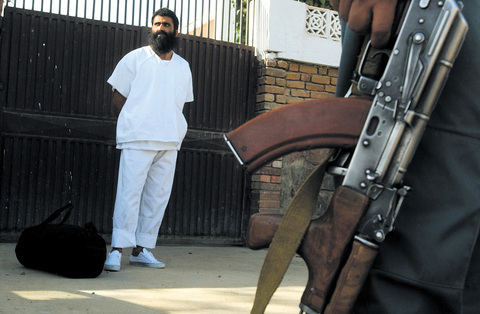Seven Afghans freed after up to five years of detention at the US naval base at Guantanamo Bay arrived in Kabul on Saturday, desperate to get back to their home villages.
The long-bearded men, mostly farmers and simple villagers, dressed in dark blue jeans and jackets, arrived at the offices of the Afghan Commission for Peace and Reconciliation here to receive an official guarantee of freedom from the Afghan government.
Most of them were from Helmand, the southern province that has become the most volatile area of Afghanistan.

PHOTO: AP
Government and foreign troops there have come under repeated attack by the Taliban and other insurgents.
One of the seven men, Haji Alef Muhammad, 62, from the Baghran district in Helmand, said he lost his brothers four years ago in a US bombardment of his village.
After that, he said, he was taken into custody during a raid, and sent to Guantanamo.
"Is this my fault that I believe in the words, `There is no God but Allah?'" he said. "Other than that there is no witness and no evidence of my guilt."
"We had to eat, pray and go to the toilet in the same cell that was 2 meters long and 2 meters wide," he said in disgust.
Another prisoner, Abdul Rahman, 38, said he was an unwilling fighter for the Taliban.
He said that he was from Helmand, but had been arrested in Kunduz Province in northern Afghanistan in late 2001 by Northern Alliance soldiers led by the Uzbek leader General Abdul Rashid Dostum.
"The Taliban sent me there by force as they made every family provide one fighter or give money instead," he said.
He said he had been taken into custody in the city of Kunduz, held in the town of Sheberghan, and then "sold" to the US military.
Another returning Afghan, Haji Baridad, who said he did not know his age, spent five years in Guantanamo.
He appeared disturbed and kept complaining that an Afghan translator took his money -- 3,600 Pakistani rupees, or about US$62 -- while he was detained.
"Ask Hazrat Mojadidi what was our crime?" he said, referring to the head of the Afghan commission.
This was the eighth round of prisoner releases from Guantanamo under a reconciliation program begun 20 months ago by the Afghan government.
Forty-seven Afghans have been released from Guantanamo in that time, and 70 remain.
Others are held at the Bagram air base, north of Kabul.
A new prison wing is under construction in Kabul to house Afghan detainees from Guantanamo who are not freed.
The talks for handing over the Afghan inmates from US prisons to Afghanistan custody have slowed in recent months.
Sebaghatullah Mojadidi, the head of the peace and reconciliation commission, said they had worked for almost a year to prepare the prison so the Afghan detainees could be brought home.
"It is not in our hand, it is in the Americans' hands," he told the seven men during a speech.
But the seven were allowed to go home.

‘TERRORIST ATTACK’: The convoy of Brigadier General Hamdi Shukri resulted in the ‘martyrdom of five of our armed forces,’ the Presidential Leadership Council said A blast targeting the convoy of a Saudi Arabian-backed armed group killed five in Yemen’s southern city of Aden and injured the commander of the government-allied unit, officials said on Wednesday. “The treacherous terrorist attack targeting the convoy of Brigadier General Hamdi Shukri, commander of the Second Giants Brigade, resulted in the martyrdom of five of our armed forces heroes and the injury of three others,” Yemen’s Saudi Arabia-backed Presidential Leadership Council said in a statement published by Yemeni news agency Saba. A security source told reporters that a car bomb on the side of the road in the Ja’awla area in

PRECARIOUS RELATIONS: Commentators in Saudi Arabia accuse the UAE of growing too bold, backing forces at odds with Saudi interests in various conflicts A Saudi Arabian media campaign targeting the United Arab Emirates (UAE) has deepened the Gulf’s worst row in years, stoking fears of a damaging fall-out in the financial heart of the Middle East. Fiery accusations of rights abuses and betrayal have circulated for weeks in state-run and social media after a brief conflict in Yemen, where Saudi airstrikes quelled an offensive by UAE-backed separatists. The United Arab Emirates is “investing in chaos and supporting secessionists” from Libya to Yemen and the Horn of Africa, Saudi Arabia’s al-Ekhbariya TV charged in a report this week. Such invective has been unheard of

US President Donald Trump on Saturday warned Canada that if it concludes a trade deal with China, he would impose a 100 percent tariff on all goods coming over the border. Relations between the US and its northern neighbor have been rocky since Trump returned to the White House a year ago, with spats over trade and Canadian Prime Minister Mark Carney decrying a “rupture” in the US-led global order. During a visit to Beijing earlier this month, Carney hailed a “new strategic partnership” with China that resulted in a “preliminary, but landmark trade agreement” to reduce tariffs — but

SCAM CLAMPDOWN: About 130 South Korean scam suspects have been sent home since October last year, and 60 more are still waiting for repatriation Dozens of South Koreans allegedly involved in online scams in Cambodia were yesterday returned to South Korea to face investigations in what was the largest group repatriation of Korean criminal suspects from abroad. The 73 South Korean suspects allegedly scammed fellow Koreans out of 48.6 billion won (US$33 million), South Korea said. Upon arrival in South Korea’s Incheon International Airport aboard a chartered plane, the suspects — 65 men and eight women — were sent to police stations. Local TV footage showed the suspects, in handcuffs and wearing masks, being escorted by police officers and boarding buses. They were among about 260 South